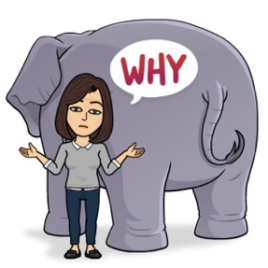I remember the night that I realized my mother’s cancer would take her life; she had suffered a psychotic break in the hospital, and I was awake all night long, holding her myself so that the nurses wouldn’t have to strap her down.
She had always been the wisest, kindest, most loving person I knew. And on this night she tried to bite me.
I texted my husband at 2 am, We are not going to be able to have the same lives after this. We’re going to have to change everything. We can move to Seattle.
I can’t explain exactly why the thought of losing my mother convinced me, in the middle of the night, to move to Seattle, except that I knew life could not go on as it always had. My mom had always been my compass, my True North. And in the four years since her death, I’ve had to learn a new way to live on the planet. I’ve had to find a new True North.
But it’s not just me, is it? In 2018, the world feels sideways, like we’re all living as I was on the night my beloved parent lost her mind.
We’re going to have to change everything.
The good news is that I was well prepared for the “change everything” task. I’ve spent the majority of my career working in the field of behavior change. I’ve read thousands of pages on behavioral economics, cognitive psychology and neuroscience, and designed dozens of programs. And after 25 years, I’ve distilled decades of scientific insight into seven practices, one word each.
These seven words have seen me through career shifts and life crises, helped me out of the wilderness of depression, anxiety and self-torment, and given me a sense of peace and focus in a world that feels pretty crazy.
As presented here, they are simple practices that you already know how to do, easy for everyone to learn and apply.
You won’t even have to move to Seattle.
The Seven Word Reset
Care. Do something kind. Reach out to a friend, make a meal, call your Congressman, volunteer, serve. Why? This taps into our “tend and befriend” instinct and is shown to build resilience, and increase happy and positive chemicals in the brain. Survivors of natural disasters who care for others have less depression and return to life faster than those who don’t; companies who look to their values during times of crisis are more likely to see their stock prices rebound.
Connect. Have a meal with a friend, write a letter, call a client. Why? Relationships are proven to be the core of happiness, the one constant factor in people who have a happy life. In both life and work, the deeper our connections, the happier and more successful we are. And again, if you think you’re bad at networking, or shy at parties, that’s just fine. You can connect in any way that feels comfortable to you.
Create. Make something. Write, build, cook, sing, knit, paint, photograph. Why? We are all here to contribute something to the world. Research has shown that when we spend time expressing ourselves in some way, we feel much more fulfilled and energized.
Learn. Get in the habit of learning something new. Listen to a podcast, read an article or a book, go to a lecture, take a class. Why? Behavioral economics, in the work of scientists such as Carol Dweck, has proven the importance of a growth mindset: of approaching life with the perspective of constant improvement. Research also shows that the most successful CEOs read fifty books a year, and spend hours each week just learning. For me, I’ve found that when I’m stuck on a work project, I can put it aside, and just go learn something for a while. The energy that I get from new ideas almost always translates back to energy for my own work.
Reflect. Actively reflect on your values, beliefs and vision. Write in a journal. Why? The simple act of writing down what you’re grateful for, or what you value, is shown to be an effective tool in stress reduction and fighting depression, as Kelly McGonigal’s research shows. When I’m feeling bummed out, I pick out a value or a positive emotion, and I write about it for a while. It’s a fantastic mood reset.
Meditate. Or pray. Why? Unlike reflection, which is about active thought, meditation is about stillness and connecting with your inner self and the universal force. It is shown to increase well being and reduce stress and anxiety. No wonder it is one discipline that recurs in every religion and spiritual practice.
Move. Walk, run, dance, play, take yoga. Why? We all know about the importance of physical activity. But I will say why the specific language of “move” helps. For me, this has been a really good way to think about exercise. There is so much science about the best way to exercise, instead of obsessing about intervals, intensity, type and duration of exercise, I make it simple: just move.
The Seven Word Science: Why These Words Work
You are already doing them. This is important. People are much much better at doing more of what we already do than we are at doing something new. Every one of us knows how to learn, can move, has created something. These are seven words you know, seven things you do, and it’s so much more effective to go from there.
It’s not work and life, separate. It’s work and life, together. Many of these practices can be done at work: connect with a customer, care for a colleague, learn something, create something. If you are consistently doing these practices at work, you are likely to be really, really good at your job, as well as happy and fulfilled in your career.
It’s a way to make a positive difference when the world feels negative. We all know how difficult the world is right now, and for a time I was struggling not to give in to anger and despair. Through the practices, I can connect with advocacy groups. I can care for people who are suffering. I can create a really excellent protest sign. It points me to a way to make a positive impact and not poison myself with upsetting world events.
The science of simple actions. These seven words are a simple path to well being. At any time you feel lost, in life or in the moment, you can take on a practice. If you’re feeling low energy, listen to a podcast on happiness, while taking a walk, perhaps, and you’ve both learned and moved. Write about gratitude, and you’ve reflected. Meditate. Call a friend (connect), or write a card to someone who’s lost a parent (care).
Whenever you take a positive action, no matter how small, it shifts the chemicals in your brain. You stop feeling helpless or overwhelmed. You start feeling powerful and connected. It is a simple reset, to be found at any time, hiding in these seven simple words.
Care, Connect, Create.
Learn, Reflect.
Meditate, Move.
We’re going to have to change everything, I thought.
But it turns out, I was wrong.
We don’t have to change everything.
All we need, we have.
All we need, we know.
We just have to put it into practice.



